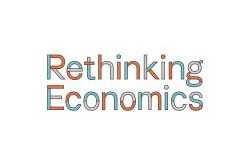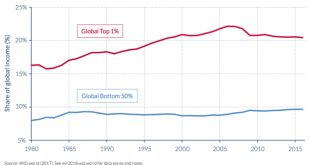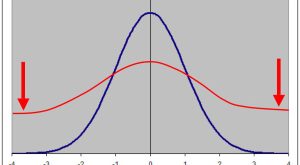from Maria Alejandra Madi Alfred Marshall wrote in his Principles of Economics that “economic conditions are constantly changing, and each generation looks at its own problems in its own way” (1920, p. v.). Our generation is confronted with many problems including climate change, environmental damage, disruptive innovations, inequality, indebtedness, youth unemployment, besides a health care crisis. At the center of these problems, however, is the discipline of economics itself and...
Read More »Dean Baker – The Economic Consequences of Mr. Trump
As tax day approached, St. Francis College Economics Professors launched their first Economics Week with three days of guest speakers, and student research. Dean Baker, co-founder and a Senior Economist at the Center for Economic and Policy Research (CEPR) in Washington, D.C. discussed "The Economic Consequences of Mr. Trump" on April 6, 2018. Baker is the writer of several books, including Rigged: How Globalization and the Rules of the Modern Economy Were Structured to Make the Rich...
Read More »Top marginal U.S. income tax rate 1913 to 2013
source: https://www.huffingtonpost.co.uk/entry/economists-tax-rich_n_6024430
Read More »The case for a new economics
from Lars Syll When the great crash hit a decade ago, the public realised that the economics profession was clueless … After 10 years in the shadow of the crisis, the profession’s more open minds have recognised there is serious re-thinking to be done … But the truth is that most of the “reforms” have been about adding modules to the basic template, leaving the core of the old discipline essentially intact. My view is that this is insufficient, and treats the symptoms rather than the...
Read More »World employers report
from David Ruccio The history of capitalism is actually a combination of two histories: it’s a history of employers attempting to hire workers and develop new technologies to make profits and expand the reach of capitalism; it’s also a history of workers banding together to improve wages and working conditions and imagine ways of moving beyond capitalism. The World Bank’s World Development Report, currently in draft form, comes down firmly on the side of employers and their historical...
Read More »Global income distribution 1800, 1975 and 2010
The tractability hoax in modern economics
from Lars Syll While the paternity of the theoretical apparatus underlying the new neoclassical synthesis in macro is contested, there is wide agreement that the methodological framework was largely architected by Robert Lucas … Bringing a representative agent meant foregoing the possibility to tackle inequality, redistribution and justice concerns. Was it deliberate? How much does this choice owe to tractability? What macroeconomists were chasing, in these years, was a renewed...
Read More »Harvard teaches us that hedge fund managers get rich even when they mess up
from Dean Baker While we all know that it is important for people to get a good education if they want to do well in today’s economy, it remains the case that who you know matters much more than what you know. Harvard has taught us this lesson well with the management of its endowment in recent years. Businessweek reported that the returns on Harvard’s endowment over the last decade averaged just 4.4 percent annually. This performance trailed both stock index returns and the returns...
Read More »Family wealth redistribution in US from 1989 to 2013
Source: https://ftalphaville.ft.com/2018/01/04/2197227/eight-charts-on-inequality-in-the-us/
Read More »Sometimes we do not know because we cannot know
from Lars Syll Some time ago, Bank of England’s Andrew G Haldane and Benjamin Nelson presented a paper with the title Tails of the unexpected. The main message of the paper was that we should not let us be fooled by randomness: The normal distribution provides a beguilingly simple description of the world. Outcomes lie symmetrically around the mean, with a probability that steadily decays. It is well-known that repeated games of chance deliver random outcomes in line with this...
Read More » Real-World Economics Review
Real-World Economics Review








